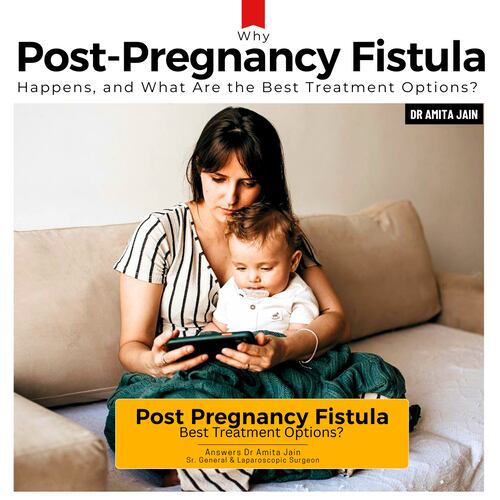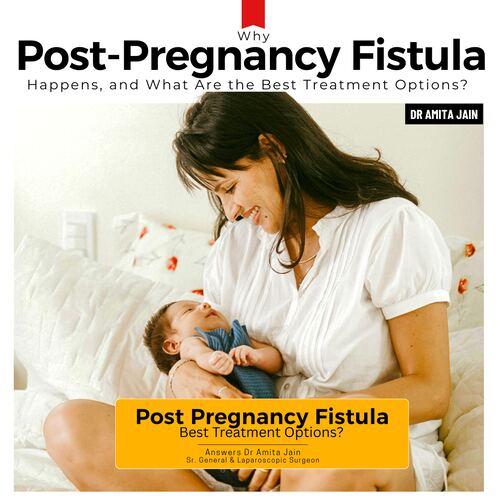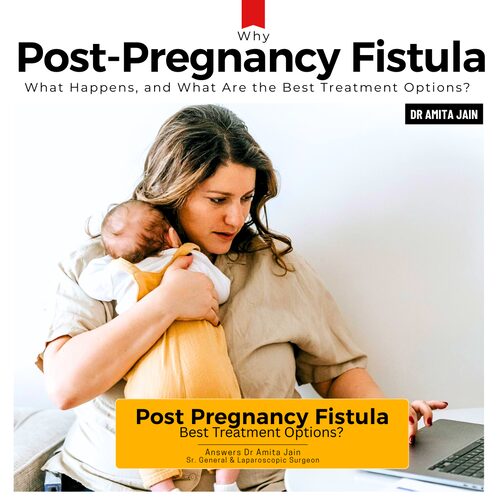Childbirth is a powerful and beautiful experience, but it can also bring unexpected physical challenges. One such complication that some women face after delivery is a post-pregnancy fistula.
It is a condition that often goes unspoken due to embarrassment, but understanding it early and getting timely treatment can make a life-changing difference, shares Dr Amita Jain who is one of most experienced General and Laparoscopic Surgeons and fistula specialists in Delhi.
What Is a Fistula?
A fistula is an abnormal passage that forms between two internal structures of the body. After childbirth, this opening appears when the surrounding tissues become damaged or weakened. Because of this small passage, fluids begin to leak continuously from one part of the body to another.
This can lead to persistent moisture, discomfort, and repeated infections if it is not diagnosed and treated on time.
Why Does Post-Pregnancy Fistula Happen?
Post-pregnancy fistulas usually develop when the tissues involved in childbirth undergo excessive pressure or injury. One of the most common reasons is prolonged or difficult labor.
When the baby’s head stays pressed against the birth canal for too long, the tissues lose their blood supply.
As the deprived tissue starts breaking down, a tiny opening may form, eventually becoming a fistula.
In some women, birth injuries such as deep tears, the use of instruments like forceps or vacuum, or extremely rapid delivery may also damage delicate internal areas, creating a pathway for fluid leakage.
Surgical procedures such as a Caesarean section or episiotomy, though generally safe, can occasionally cause tissue trauma that later results in a fistula.
Post-delivery infections can further slow healing and weaken tissues, increasing the chances of an opening developing.
In addition, factors like poor nutritional status, delayed postpartum care, and slow healing responses can raise the risk of tissue breakdown after childbirth.
Common Signs Mothers May Notice
Women with a fistula often experience constant leakage of urine or other fluids. This persistent wetness may lead to irritation, soreness, and recurrent infections.
Many also experience a strong, unpleasant discharge that adds to the discomfort. Beyond the physical effects, the continuous moisture can lead to emotional distress, loss of confidence, and social withdrawal.
Recognizing these symptoms early and seeking medical help is crucial for proper recovery.
Best Treatment Options for Post-Pregnancy Fistula
Treatment depends on the size, severity, and age of the fistula. In very early stages, when the opening is small and newly formed, doctors may attempt conservative management.
This includes treating any infection, improving nutrition, and temporarily diverting fluids so the tissue has a chance to heal naturally. Some small fistulas close on their own with this approach.
For most women, however, surgical repair remains the most effective solution. During surgery, the surgeon closes the opening and reconstructs the surrounding tissues to restore normal function.
Modern surgical techniques ensure minimal discomfort and promote faster recovery. Many women return to normal daily life with full control once healing is complete.
In selected cases, minimally invasive procedures may be offered. These techniques use specialized instruments to repair the fistula from within, allowing quicker recovery and less postoperative discomfort. After any type of repair, proper rehabilitation is essential.
Doctors often recommend pelvic-floor strengthening, infection prevention measures, and scheduled follow-ups to ensure healthy healing.
Can Post-Pregnancy Fistula Be Prevented?
Many cases can be prevented with timely and attentive obstetric care. Monitoring labor closely, taking proactive steps during difficult deliveries, and promptly managing postpartum infections significantly reduce the risk.
Adequate nutrition, hydration, and postpartum care also play an important role in supporting natural healing and keeping tissues healthy.
Post-pregnancy fistula is a distressing but treatable condition. With awareness, early diagnosis, and the right medical care, women can heal completely and regain their comfort, dignity, and confidence.
Any new mother experiencing persistent leakage or unexplained discomfort after childbirth should reach out to a healthcare professional without delay.
Early intervention makes recovery smoother and far more successful.

Dr Amita Jain is one of India’s most distinguished and experienced senior surgeons who has conducted more than 1,00,000 successful surgeries, and has covered a wide spectrum of general and minimally invasive procedures. Dr Amita Jain is refered as the pioneer surgeon in the fields of Gallbladder stone removal surgery, appendix removal surgery, hernia repair surgery, Pilonidal Sinus treatments, varicose vein and piles surgery, fistula surgery and fissure surgeries.
With an outstanding career spanning over 29 years, Dr Amita Jain has earned her place among the top General and Laparoscopic surgeons in Delhi and India, known for her precision, compassion, and consistent surgical excellence. She was the Professor of Surgery at the Army College of Medical Sciences and Base Hospital, Delhi Cantt. In 1994, she was commissioned as a surgeon under the United Nations Mission in Congo.
Dr Amita Jain currently serves as the Head of Department and Senior Consultant for General, Laparoscopic and Trauma Surgery at Artemis Lite Hospital, Rosewalk – Luxury Maternity Hospital in Delhi (Panchsheel Park, Delhi) and Rainbow Children Hospitals (Malviya Nagar, Delhi).


